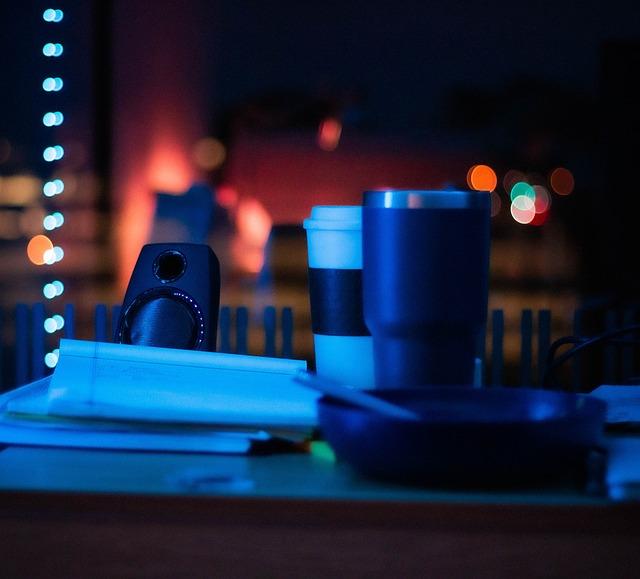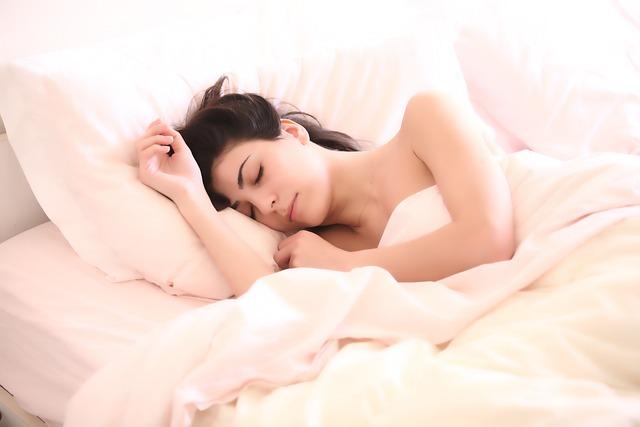Waking Up at 1am Meaning: What Could It Possibly Mean?

Have you ever found yourself suddenly jolted awake at 1am, wondering what on earth could be the meaning behind this untimely disturbance? If so, you’re not alone. As mysterious as it may seem, there could actually be a deeper significance to waking up at this peculiar hour. In this enlightening article, we will delve into the possible meanings behind this odd occurrence, exploring various cultural, spiritual, and scientific explanations. Buckle up as we embark on a journey to uncover the secrets of waking up at 1am and discover what it could possibly mean for you.
Contents
- – Understanding the Science Behind Waking Up at 1am: Exploring the Circadian Rhythm and Sleep Cycles
- – Unveiling the Symbolism of Waking Up at 1am: Unraveling Possible Spiritual and Psychological Meanings
- – Common Factors that Can Trigger Waking Up at 1am: Stress, Anxiety, and Everyday Habits
- – Impact of Waking Up at 1am on Physical and Mental Well-being: How it Affects Your Day
- – Strategies for Dealing with Waking Up at 1am: Tips to Improve Sleep Quality and Break the Pattern
- Strategies for Dealing with Waking Up at 1am: Tips to Improve Sleep Quality and Break the Pattern
- – Exploring Natural Remedies to Address Waking Up at 1am: From Herbal Teas to Relaxation Techniques
- – Seek Professional Help: Consulting a Sleep Specialist or Therapist about Your Waking Up Pattern
- – Maintaining a Sleep Diary: Understanding Patterns and Triggers to Take Control of Your Sleep
- - Mindfulness and Meditation: Harnessing the Power of Mindful Practices to Promote Better Sleep
- – Embracing a Healthy Lifestyle: Nutrition, Exercise and Holistic Approaches to Improve Your Sleep
– Understanding the Science Behind Waking Up at 1am: Exploring the Circadian Rhythm and Sleep Cycles
Have you ever found yourself abruptly waking up at 1am, wondering why on earth your body decided that was the perfect time to rise from slumber? Don’t worry, you’re not alone. This phenomenon, known as waking up at 1am, is actually rooted in the science of our internal body clock, known as the circadian rhythm.
<p>Our circadian rhythm is a natural, biological process that regulates our sleep-wake cycle, among other bodily functions. It is influenced by various external factors such as light, temperature, and even social cues. Understanding this fascinating phenomenon and its connection to waking up at 1am can provide valuable insight into our sleep patterns.</p>
<p>Research suggests that waking up at 1am could be linked to our sleep cycles. Each sleep cycle typically lasts about 90 minutes, and we experience multiple cycles throughout the night. Waking up at 1am might indicate that you have completed a full sleep cycle and entered a lighter stage of sleep. During this stage, it is common for our bodies to briefly awaken before transitioning into the next cycle. If you find yourself wide awake at this time, try not to stress. It is a natural occurrence that can often be managed with simple strategies such as deep breathing, guided meditation, or reading a book to help you drift back into dreamland.</p>– Unveiling the Symbolism of Waking Up at 1am: Unraveling Possible Spiritual and Psychological Meanings
One of the most perplexing experiences is waking up at 1am in the middle of the night. It leaves us wondering if there is a deeper meaning behind this seemingly common occurrence. Well, you’re not alone in your curiosity! Many people have pondered the significance of waking up at this hour, and there are various spiritual and psychological interpretations that might shed some light on the matter.
From a spiritual perspective, waking up at 1am is believed to be a sign of heightened intuition and connection with the spiritual realm. In certain spiritual practices, 1am is considered a powerful time for meditation or prayer, as it is said to be an opportune moment to receive divine guidance. Some believe that waking up at this hour could also be a signal from your guardian angels or spirit guides, trying to communicate with you and provide guidance on your life path.
On the psychological front, waking up at 1am could point towards underlying stress or anxiety. The sleep cycle is divided into several stages, and waking up often indicates disruptions in these stages. If you find yourself consistently waking up at 1am, it may be worth examining your daily routine and identifying any potential stressors that could be affecting your sleep. Taking steps to address and manage these stressors can help promote better sleep quality and overall well-being.
While there is no one-size-fits-all explanation for waking up at 1am, it’s fascinating to explore the possible spiritual and psychological meanings behind this phenomenon. Remember, understanding the underlying reasons can help you gain insights into your own experiences and guide you towards a more balanced and harmonious life. Embrace the mysterious journey of unraveling the symbolism behind waking up at 1am, and let it be a catalyst for personal growth and self-discovery.
– Common Factors that Can Trigger Waking Up at 1am: Stress, Anxiety, and Everyday Habits
Many people have experienced the frustration of waking up in the middle of the night, especially at the peculiar hour of 1am. While it may seem like a random occurrence, there are actually common factors that can trigger this early awakening. Stress and anxiety are often major culprits when it comes to disrupted sleep patterns. If your mind is racing with worries and thoughts, it can be difficult to stay asleep throughout the night.
Additionally, everyday habits can also play a role in waking up at 1am. Consuming caffeine too close to bedtime, for example, can stimulate your nervous system and make it harder to fall back asleep if you wake up in the middle of the night. Similarly, eating heavy meals late at night can lead to issues with digestion, causing discomfort that disrupts your sleep.
To better understand why you might be waking up at 1am, it can be helpful to reflect on your current stress levels and daily habits. By addressing these potential triggers, you may be able to improve the quality of your sleep and reduce the frequency of early awakenings. Consider practicing stress management techniques, such as deep breathing exercises or meditation, before bed. Additionally, try to establish a regular sleep routine and limit caffeine and heavy meals in the evening. Remember, everyone’s sleep patterns are unique, so it may take some trial and error to find what works best for you.
– Impact of Waking Up at 1am on Physical and Mental Well-being: How it Affects Your Day
Waking up at 1am can be a perplexing and unsettling experience. While most people are fast asleep, those who find themselves wide awake at this hour may wonder what it could possibly mean. The timing of waking up at 1am holds significance in the realm of sleep and can have both physical and mental implications for your overall well-being.
Physically, waking up at 1am may disrupt your natural sleep cycle and lead to feelings of grogginess and fatigue throughout the day. This is because our bodies undergo different stages of sleep, with each stage serving a unique purpose. Disrupting these stages by waking up at an irregular time can leave you feeling unrefreshed and may impact your ability to concentrate or perform daily tasks with ease.
Mentally, waking up at 1am can also affect your cognitive function and emotional well-being. Lacking sufficient restorative sleep can hinder your ability to think clearly and make rational decisions. It may even contribute to mood swings, irritability, and increased stress levels.
To mitigate the negative impact of waking up at 1am, it is crucial to identify the underlying factors causing this phenomenon. It could be related to various factors such as stress, anxiety, poor sleep hygiene, or even an underlying sleep disorder. Consulting a healthcare professional or sleep specialist may be necessary to explore potential solutions and restore a healthy sleep schedule.
– Strategies for Dealing with Waking Up at 1am: Tips to Improve Sleep Quality and Break the Pattern
Strategies for Dealing with Waking Up at 1am: Tips to Improve Sleep Quality and Break the Pattern
Are you frequently finding yourself wide awake at 1am, wondering why you can’t seem to have a restful night’s sleep? Waking up at this time might seem puzzling, but it could actually have deeper meaning relating to your body’s natural rhythm and overall well-being. Understanding the possible reasons behind this pattern can help you take appropriate steps to address it.
The Circadian Rhythm Connection
One possible explanation for consistently waking up at 1am is a disruption in your circadian rhythm. This internal clock helps regulate our sleep-wake cycle, and if it’s thrown off balance, it can affect our ability to stay asleep throughout the night. To reset your circadian rhythm, try implementing these strategies:
- Maintain a Consistent Sleep Schedule: Go to bed and wake up at the same time every day, even on weekends, to establish a routine.
- Create a Relaxing Bedtime Ritual: Engage in calming activities, such as reading or taking a warm bath, to signal to your body that it’s time to wind down.
- Avoid Stimulants: Limit or avoid caffeine, nicotine, and alcohol, especially in the evening, as they can disrupt your sleep patterns.
Addressing External Factors
Aside from circadian rhythm disruptions, other factors can contribute to waking up at 1am. It’s crucial to identify and address any underlying issues that may be affecting your sleep quality. Here are some additional strategies to consider:
- Create a Sleep-Friendly Environment: Ensure your bedroom is cool, dark, and quiet, optimizing conditions for a good night’s sleep.
- Manage Stress Levels: Find healthy ways to cope with stress, such as practicing relaxation techniques or seeking support from loved ones.
- Limit Screen Time: Blue light emitted by electronic devices can interfere with your sleep. Avoid using screens for at least an hour before bed.
Remember, everyone’s sleep patterns can vary, and it may take some trial and error to find the strategies that work best for you. By incorporating these tips and making adjustments where necessary, you can improve your sleep quality and break the cycle of waking up at 1am.
– Exploring Natural Remedies to Address Waking Up at 1am: From Herbal Teas to Relaxation Techniques
Are you one of those people who consistently wakes up at 1am, night after night, wondering what on earth could be causing it? Well, you’re not alone. Waking up at such a specific time can be quite frustrating and leave you feeling exhausted each morning. But fear not, there are natural remedies that can help address this issue and ensure you get a restful night’s sleep.
One effective remedy is herbal teas. These teas have been used for centuries to promote relaxation and improve sleep quality. Chamomile, lavender, and valerian root are just a few examples of herbs that are known for their calming properties. Brew yourself a warm cup of herbal tea before bedtime and let the natural ingredients work their magic, helping you fall into a deep slumber and avoiding those pesky 1am wake-up calls.
Another approach worth considering is relaxation techniques. Engaging in activities that help you unwind before bed can significantly improve your sleep patterns. Some popular techniques include deep breathing exercises, meditation, and progressive muscle relaxation. These practices can calm your mind and body, easing any stress or anxiety that may be preventing you from staying asleep through the night. Try incorporating these techniques into your nightly routine and notice the difference they can make in helping you achieve a more restful sleep.
Finding out the meaning behind your 1am wake-up calls might seem like a mystifying dilemma, but rest assured, there are natural remedies available. Incorporating herbal teas and relaxation techniques into your routine can help promote a more peaceful night’s sleep, allowing you to wake up feeling refreshed and energized each morning. So bid farewell to those early morning awakenings and say hello to a good night’s rest.
– Seek Professional Help: Consulting a Sleep Specialist or Therapist about Your Waking Up Pattern
Seeking professional help can be a valuable step in understanding and addressing your waking up pattern at 1am. Consulting with a sleep specialist or therapist can provide you with insights and strategies to improve your sleep quality and overall well-being. Here are a few reasons why seeking professional help may be beneficial:
-
Expertise and Diagnosis: Sleep specialists and therapists have in-depth knowledge and expertise in the field of sleep disorders and mental health. They can conduct a comprehensive evaluation to determine the underlying causes of your early awakening. This could include assessing your sleep environment, lifestyle habits, and any underlying medical or psychological conditions.
-
Personalized Treatment Plan: Once a diagnosis is established, a sleep specialist or therapist can create a personalized treatment plan tailored to your specific needs. This may involve implementing sleep hygiene practices, cognitive-behavioral therapy for insomnia (CBT-I), or medication, based on the severity and nature of your waking up pattern.
- Emotional Support and Coping Mechanisms: Dealing with disrupted sleep can take a toll on your mental and emotional well-being. A therapist can provide you with emotional support, helping you address any stress, anxiety, or other psychological factors that may be contributing to your early awakening. They can also teach you effective coping mechanisms and relaxation techniques to promote better sleep.
Remember, it is important to consult with a qualified professional who specializes in sleep or mental health. They can guide you every step of the way in understanding the meaning behind your waking up at 1am and finding effective solutions to improve your sleep. Don’t hesitate to reach out for support and take the necessary steps towards a healthier sleep routine.
– Maintaining a Sleep Diary: Understanding Patterns and Triggers to Take Control of Your Sleep
Maintaining a sleep diary is a powerful tool that can help you understand the patterns and triggers that may be affecting your sleep. By consistently documenting your sleep habits, you can gain valuable insights into your sleep quality, duration, and potential disturbances. This information is essential in taking control of your sleep and improving your overall well-being.
To maintain a sleep diary effectively, consider including the following information:
-
Bedtime routine: Note down the activities you engage in before going to bed. This could include things like reading a book, taking a warm bath, or practicing relaxation techniques. Identifying a consistent bedtime routine can signal your body that it’s time to relax and prepare for sleep.
-
Sleep duration: Keep track of the total amount of sleep you get each night. Aim for at least 7-9 hours of quality sleep to ensure proper rest and rejuvenation.
-
Sleep environment: Record details about your sleeping environment, such as room temperature, noise levels, and comfort of your mattress and pillows. Creating a comfortable and conducive sleep environment can significantly improve the quality of your sleep.
- Waking up at 1am: If you frequently find yourself waking up at 1am, it may be helpful to note any potential triggers or recurring factors. Consider things like late-night meals, caffeine intake, stress levels, or noise disturbances. Identifying the underlying cause of this pattern can guide you towards finding effective solutions to address it.
Using these insights from your sleep diary, you can then make small adjustments to your routine, environment, or behaviors that can positively impact your sleep. Remember that everyone’s sleep needs and patterns are unique, so it may take time to discover what works best for you. Regularly reviewing and recording in your sleep diary will give you the knowledge and control needed to achieve restful nights and wake up feeling refreshed.
- Mindfulness and Meditation: Harnessing the Power of Mindful Practices to Promote Better Sleep
Have you ever woken up at 1am feeling wide awake and wondering what could be the reason behind it? This mysterious midnight wake-up call can be quite frustrating, especially when you’re in the middle of a good night’s sleep. But fear not, there might be an explanation for it.
One possible reason for waking up at 1am could be an imbalance in your body’s energy or what is commonly referred to as “qi” in Chinese medicine. According to the Chinese body clock, each organ has a specific time when it functions optimally. Waking up at 1am could be an indicator of liver imbalances, which might indicate anger, stress, or even an excessive intake of alcohol or unhealthy fats. Taking note of your overall health and lifestyle choices can help in identifying the underlying cause.
Another possible reason for waking up at 1am could be related to your sleep cycle. Our sleep is divided into different cycles, each lasting around 90 minutes. If you wake up at 1am, it might indicate that you have completed the first phase of your sleep cycle and are transitioning into the second phase. This is a natural occurrence and may not necessarily be a cause for concern.
To promote better sleep and prevent frequent wake-ups at 1am, incorporating mindfulness and meditation practices into your daily routine can be beneficial. Mindfulness techniques such as deep breathing exercises, progressive muscle relaxation, or guided imagery can help calm the mind and prepare your body for a restful night’s sleep. Additionally, practicing meditation before bedtime can help relax both the mind and body, making it easier to fall asleep and remain asleep throughout the night.
Remember, everyone’s sleep patterns and experiences may vary, so it’s important to listen to your body and make adjustments accordingly. By incorporating mindful practices into your daily routine, you can harness the power of these techniques to promote better sleep and wake up feeling refreshed and rejuvenated.
– Embracing a Healthy Lifestyle: Nutrition, Exercise and Holistic Approaches to Improve Your Sleep
In today’s fast-paced world, it’s not uncommon to find ourselves waking up at odd hours of the night, wondering why we can’t seem to get a restful night’s sleep. One common occurrence that many people experience is waking up at 1am. But what does it mean? Is there some hidden message that our bodies are trying to send us?
Waking up at 1am could have several possible meanings, ranging from physical to emotional reasons. One possible explanation is that your body is trying to tell you that you need to make some changes to your lifestyle. Poor nutrition and lack of exercise can have a significant impact on your sleep quality. By embracing a healthy lifestyle that includes balanced nutrition and regular exercise, you can improve your overall sleep patterns.
Another possible reason for waking up at 1am could be related to stress or anxiety. Our bodies are incredibly complex, and sometimes they can manifest our emotional struggles through physical symptoms, such as sleep disturbances. By exploring holistic approaches, such as meditation or journaling, you may be able to find relief and improve your quality of sleep.
It’s important to remember that everyone’s experience with sleep disruptions can vary, and there could be other factors at play. If you find yourself consistently waking up at 1am or experiencing other sleep issues, it may be beneficial to seek professional help from a healthcare provider or sleep specialist. They can provide personalized guidance and solutions to help you achieve a good night’s rest. Remember, sleep is essential for our overall well-being, so don’t hesitate to seek help and make the necessary changes to improve your sleep quality. So there you have it—the meaning behind waking up at 1am! As we now know, this seemingly odd occurrence could actually hold significant insight into our lives. Whether it’s a sign of physical discomfort, emotional imbalance, or spiritual awakening, waking up at 1am may be your body’s way of sending a message. By paying attention to these signals and seeking balance in our daily routines, we can strive for a healthier, more harmonious lifestyle. So next time you find yourself wide awake in the middle of the night, take a moment to reflect on what your body and mind might be trying to tell you. It could be the key to unlocking a world of personal growth and well-being.














